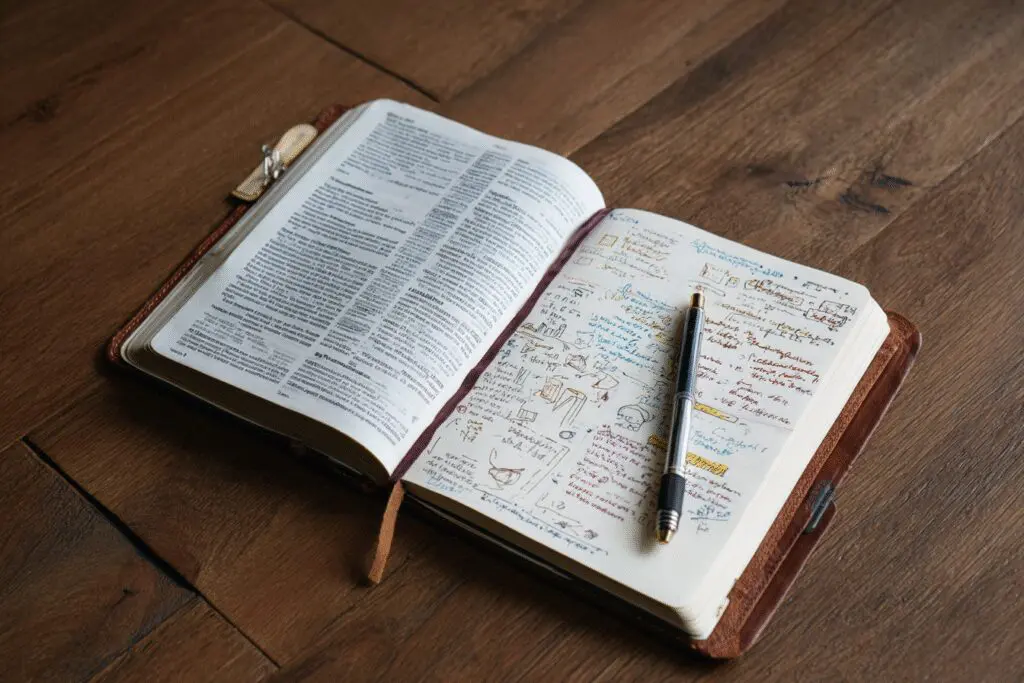Have you ever closed your Bible and felt nothing? You read the words. You know they are important. But they feel distant. Like a story about someone else, from a long time ago. What if you could change that? What if the Bible could become a living conversation? This is how to journal the Bible. It’s a method that truly changed my life. And I believe it can change yours too.
This isn’t about fancy art or perfect handwriting. It’s about a real connection with God. It’s about hearing His voice in your daily life. Let’s explore this simple, powerful path together.
More in Bible Category
How to Read the Bible for Beginners
What Bible Should I Read as a Beginner
Key Takeaways
- Bible journaling is an active conversation with God, not just passive reading.
- You don’t need special tools. A simple notebook and a pen are all it takes to start.
- A simple method like S.O.A.P. provides a clear structure for your journaling time.
- Consistency is more important than perfection. Just a few minutes each day can make a huge difference.
- The goal is a deeper relationship with Jesus, not a perfect-looking journal.
What’s the Real Difference Between Reading and Truly Hearing God’s Word?
For years, I was a Bible reader. I would check it off my to-do list each morning. But the words rarely stuck with me. They didn’t seem to connect to my actual life. My struggles, my worries, my hopes. It felt like a one-way street. I was doing all the work. And I wasn’t getting much back. I was missing the point entirely.
My Own Struggle with a “Quiet” Bible
I remember feeling frustrated. I knew the Bible was God’s Word. I knew it was supposed to be powerful. Yet, for me, it was quiet. The pages felt flat. My heart didn’t feel changed after I read them. I started to wonder if I was doing something wrong. Maybe I just wasn’t spiritual enough to “get it.”
This feeling is more common than you think. Many Christians feel this way. They love God. They respect the Bible. But they struggle to build a deep, personal connection through its pages. That is where journaling came in and changed everything for me. It turned my monologue into a dialogue. It gave God a chance to speak back.
How to Journal the Bible: My Simple S.O.A.P. Method Revealed
So, how do you start? There are many ways to journal. But I want to share the one that helped me the most. It’s simple to remember and easy to do. It’s called the S.O.A.P. method. It stands for Scripture, Observation, Application, and Prayer. This simple framework will guide your time in the Word. It makes sure you not only read the Bible but truly listen to it.
S – Scripture: What Verse Is Speaking to You Today?
First, you need to choose a scripture. This might seem hard. But don’t overthink it. You don’t need to read a whole chapter. In fact, it’s better if you don’t. Start small.
Before you open your Bible, say a simple prayer. Ask the Holy Spirit to guide you. Ask Him to highlight a verse that He wants you to hear today. Then, start reading a passage. It could be from a devotional. Or maybe a book of the Bible you are working through.
Read slowly. Wait for a word or a phrase to stand out. It will. Something will catch your eye. It will feel important for you, right now. Once you find it, stop. That’s your verse for the day. Now, write it down at the top of your journal page. Write the entire verse out. This simple act of writing helps you slow down. It helps you focus on what the words actually say.
O – Observation: What Does the Bible Actually Say?
Next, you observe. This step is about looking at the verse closely. You aren’t trying to find the personal meaning just yet. You are just looking at the facts. You are like a detective examining the evidence. This keeps you from misinterpreting the Bible. It grounds your journaling in truth.
Ask yourself some simple questions. Write down the answers in your journal. Here are some ideas:
- Who wrote this verse?
- Who was it written to?
- What is happening in the story around this verse?
- Are there any words that are repeated?
- What is the main idea of this verse?
- Are there any cross-references or other verses that connect to this one?
This part doesn’t have to be a deep theological study. Just write down what you see. You might be surprised what you notice when you take a moment to just observe. It makes the Bible come alive in a new way.
A – Application: How Does This Verse Change My Life Right Now?
Now it’s time to get personal. This is the heart of Bible journaling. This is where the ancient Word meets your modern life. The application step answers the question: “So what?” How does this truth change the way I live today?
Think about your own life. Your work, your family, your relationships, your fears. How does the verse you chose speak into those areas? This is where you connect the dots. You ask the Holy Spirit to show you how to live out this truth.
For example, maybe your verse is Philippians 4:6. “Do not be anxious about anything.” For your application, you could write: “God is telling me not to worry about my presentation at work. Instead of feeling anxious, I can bring this situation to Him in prayer. He cares about it. He will give me peace.”
This is the step that leads to real transformation. It’s what makes the Bible more than just a history book. It becomes your personal guide for life.
P – Prayer: How Can I Talk to God About This?
Finally, you pray. This last step turns your journaling into a direct conversation with God. You’ve read His word. You’ve observed it. You’ve applied it to your life. Now, you talk to Him about it.
Your prayer can be simple. You can write it right there in your journal. Use the verse you studied as a starting point. Thank God for what He has shown you. Ask for His help to live out the application. Confess any ways you have failed in this area. Praise Him for His truth and His goodness.
Writing your prayer is powerful. It helps you focus your thoughts. It creates a record of your conversations with God. Looking back on these prayers later can be a huge source of encouragement. You can see how God has been faithful. You can see how He has answered your prayers over time.
Do I Need a Fancy Journal and Expensive Pens to Start?
Many people get stuck here. They see beautiful Bible journals on social media. They think they need to be an artist. They think they need special supplies. This is not true at all. These things can be fun. But they are not necessary.
The goal of Bible journaling is not to create a masterpiece. The goal is to meet with the Master. God cares about your heart. He doesn’t care about your handwriting or your brand of pen.
All you really need are two simple things:
- A Bible
- Something to write with and on
That’s it. You can use a spiral notebook from the grocery store. You can use the notes app on your phone. You can use a simple pen that you found in your car. Do not let the tools become a barrier. The most important thing is to just start.
Finding the Right Bible for Journaling
While any Bible will work, some are designed to help. A journaling Bible can be a great tool. These Bibles have extra-wide margins. This gives you space to write your notes, prayers, and thoughts right next to the text. It keeps everything in one place.
You don’t need to buy one right away. But if you find that you enjoy journaling, it might be a good investment. It can become a wonderful keepsake. A record of your journey with God that you can look back on for years to come.
Your Sacred Space: Does It Matter Where You Journal?
Finding a consistent time and place can make a big difference. It signals to your brain that it’s time to focus. It helps build a lasting habit. This doesn’t mean you need a private prayer room. Your “sacred space” can be very simple.
It could be a comfy chair in your living room. It could be the kitchen table before anyone else wakes up. It could even be in your car during your lunch break. The key is to find a place where you can have a few minutes of quiet. A place where you can be alone with God and His Word without too many distractions.
What Happens When Bible Journaling Feels Like a Chore?
There will be days when you don’t feel like it. The passion might fade. It might start to feel like another item on your to-do list. This is normal. Every meaningful relationship has its ups and downs. Your relationship with God is no different.
The key is not to give up. Don’t rely on your feelings. Rely on your commitment. On these days, the habit you have built will carry you through. Just show up. Open your Bible. Write down a single verse. God will honor your faithfulness, even when you don’t feel inspired.
How Do I Find the Time in a Busy Schedule?
Life is busy. This is a real challenge for most of us. It is easy to let our time with God get pushed aside. We have to be intentional. We have to make it a priority.
Look at your daily schedule. Where can you find 15 minutes? That’s all it takes to start.
- Could you wake up 15 minutes earlier?
- Could you use 15 minutes of your lunch break?
- Could you turn off the TV 15 minutes earlier at night?
The time is there. We just have to choose to use it for this purpose. Start small. A consistent 15 minutes every day is far better than a frustrating hour once a week.
What if I Don’t Understand a Passage?
You will come across verses that are confusing. You will have questions that you can’t answer. This is okay! It is not a sign of failure. It is an opportunity to learn and grow.
First, don’t be afraid to write down your questions in your journal. Just write, “God, I don’t understand what this means.” It’s an honest prayer. Second, use good resources to help you. A good study Bible can provide helpful notes. There are also many excellent and reliable online resources. For serious study, university websites are a great place to find trustworthy tools. For instance, Yale Divinity School’s library offers a curated list of online biblical resources that can help you dig deeper.
Is It Okay to Be Messy and Imperfect in My Journal?
Yes. A thousand times, yes. Your Bible journal is for you and God. It is not for anyone else to see unless you choose to share it. It is a safe place. It’s a place for you to be real, honest, and vulnerable.
Some entries will be deep and profound. Others will be simple and short. Some days you will have messy handwriting. You might have doubts and questions. You might even write down feelings of anger or frustration. That is perfectly fine. God already knows your heart. The journal is just a tool to help you process it with Him. Let go of perfection. Embrace the beautiful mess of a real relationship.
How Will My Life Change if I Consistently Journal the Bible?
This isn’t just a nice spiritual hobby. Consistently journaling the Bible will lead to real, lasting change in your life. It’s one of the most powerful spiritual disciplines you can practice. The benefits will ripple out into every area of your life.
You’ll Remember Scripture Like Never Before
When you simply read a verse, you might forget it an hour later. But when you write it down, when you observe it, and when you apply it, something amazing happens. The verse moves from your short-term memory to your long-term memory. It gets rooted in your heart.
The Holy Spirit will then bring that verse to your mind when you need it most. In a moment of temptation. In a moment of fear. In a moment of decision. God’s Word will be right there with you, ready to guide and strengthen you.
You’ll Experience a Deeper, More Personal Relationship with God
Bible journaling changes your relationship with God from formal to personal. He is no longer just a figure in a book. He becomes a friend. A counselor. A father who speaks directly to you. You begin to recognize His voice.
You will see His faithfulness as you look back through your journal. You will see how He has guided you. How He has answered your prayers. Your trust in Him will grow. Your love for Him will deepen. This is the ultimate goal. A vibrant, thriving, personal relationship with your Creator.
You’ll Gain Wisdom and Guidance for Your Daily Decisions
Life is full of choices. Big and small. What career should I pursue? How should I handle this conflict with a friend? How can I be a better parent or spouse? The Bible is full of wisdom for these very questions.
Through journaling, you learn how to apply that wisdom to your specific circumstances. It becomes your compass. You start to see your life from God’s perspective. You make choices that are aligned with His will. This brings a sense of peace and purpose that you can’t find anywhere else.
It’s a slow and steady process. But over time, you will look back and see a clear pattern. You will see how God’s Word has shaped you. How it has molded your character. You will be a different person. A person who is more like Jesus.
So, don’t wait any longer. Don’t wait for the perfect journal or the perfect time. Just start. Grab a notebook and a pen. Open your Bible. And start the conversation. It’s a conversation that will change your life forever.
Frequently Asked Questions – How to Journal the Bible

How do I find time for Bible journaling amid a busy schedule?
You can start with just 10 minutes a day by writing a verse and a short prayer or reflection. Even a brief journaling session can be meaningful. The goal is consistency, not length, so find small pockets of time that fit into your day and make it a regular habit.
What are some creative Bible journaling methods I can try?
Creative methods include art journaling, where you draw or paint inspired by scripture, and written journaling, which involves deep writing, letters, or poetry. You can also try verse mapping, where you analyze and explore a verse in depth, to enhance your understanding and engagement.
How can I start journaling the Bible if I am a beginner?
A great way to start is with the S.O.A.P. method, which stands for Scripture, Observation, Application, and Prayer. Begin by choosing one verse, writing it down, observing its meaning, applying it to your life, and ending with a prayer. This simple plan keeps your journaling focused and manageable.
What are the basic supplies needed for Bible journaling?
You only need a Bible or notebook and a good pen that does not bleed through thin pages. Optional supplies include art tools like colored highlighters, stickers, and stamps, but these are not necessary to start. The key is to keep it simple and focused on your personal connection with Scripture.
What is Bible journaling and how can it help me in my faith journey?
Bible journaling is the practice of writing down your thoughts, questions, and reflections about scripture to deepen your understanding and connection with God. It helps you remember more, makes the Bible personally meaningful, and creates a faith story by recording how God has worked in your life.




